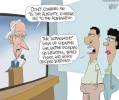How much can one man change the world?
We pause today to honor the life of a proud capitalist who changed all our lives, almost entirely for the better, by some measures almost beyond recognition.
Will his name be as well-remembered a century from now as those of Carnegie, Rockefeller, Edison and Ford? Or will it fade till it becomes a trivia answer like George Stephenson (the steam locomotive) or Philo Farnsworth (television)?
Fifty years ago, so-called experts said no one would ever want a computer in their home — too large and expensive. In 1976, college dropout Steve Jobs sold his micro-bus. His friend Steve Wozniak sold his calculator. With the resulting $1,300, they founded the Apple Computer Co., currently worth $222 billion. Their idea was to build a home computer.
First year sales of the 1977 Apple II? $2.7 million. Within three years, sales hit $200 million.
In 1984 came the Macintosh. The display had small pictures called icons. To use the computer, the user pointed at an icon and clicked a button using a device — PC columnist John C. Dvorak said “there is no evidence that people want to use these things” — called the mouse.
But competitors already were offering better features on their personal computers, as well as high-quality printers.
Steve Jobs resigned from Apple in 1985, bought a small company called Pixar from filmmaker George Lucas which, years later, released the animated feature “Toy Story.” Why? He was already worth billions. Maybe it wasn’t the money.
Mr. Jobs returned to Apple. In 1997, he announced Apple would sell computers over the Internet and by telephone. Within a week, The Apple Store was the third-largest e-commerce website. Mr. Jobs was again CEO of Apple.
In 1998 came the iMac, including the wireless net surf-and-download capabilities of the AirPort. Record stores started to close. In 1999 came the iBook. Add another “doomed” venture that couldn’t have happened without the home computer, Jeff Bezos’ Amazon, and pretty soon brick-and-mortar bookstores started to close.
Then came the iPod. Then the iPhone. Then the iPad.
How quickly can one man change the world?
In 1996, Time magazine quoted Mr. Jobs saying: “The thing that drives me and my colleagues is that you see something very compelling to you, and you don’t quite know how to get it, but you know, sometimes intuitively, it’s within your grasp. And it’s worth putting in years of your life to make it come into existence.”
No one in Washington “planned” the personal computer, any more than anyone could “plan” for a Steve Jobs.
There are those who would have wished to see him taxed within an inch of his life, of course, to punish him for his “greed.” But one gets the feeling that, to a man like Steve Jobs, income was just the way the market told him whether he was providing what people wanted.
In a free market, from time to time, a visionary like Steve Jobs just happens. He changes the world and leaves us two choices: Grow rich with the help of one of the new industries he and his imitators create, or just get out of the way.


















